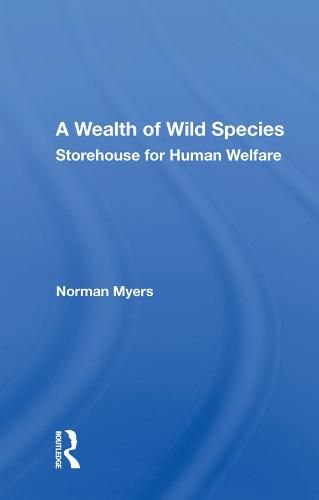Readings Newsletter
Become a Readings Member to make your shopping experience even easier.
Sign in or sign up for free!
You’re not far away from qualifying for FREE standard shipping within Australia
You’ve qualified for FREE standard shipping within Australia
The cart is loading…






As environmentalists and wildlife enthusiasts argue for preservation of wild species, they sometimes overlook a most compelling fact-the survival of wild species directly benefits humans. Like the Earth’s most precious minerals, the planetary gene pool is a valuable natural resource that is vulnerable to irreversible harm. Yet, if present trends toward extinction persist, possibly one-third and conceivably one-half the entire spectrum of species may be lost to us within another century. What does this mean? In 1960, a child suffering from leukemia had only one chance in five of remission. Today, thanks to a drug developed from an obscure tropical forest plant, the rosy periwinkle, the odds are reversed and that child has an 80 percent chance. In fact, each time we take a doctor’s prescription to a pharmacy, there is a one-in-two chance that the medication we collect originated in the unique properties of a wild plant or animal. Wild species of plants also hold the promise of revolutionizing agriculture around the world, and their uses as foods, sources of new chemicals for pest control, and even new kinds of contraceptives are being developed. Wild animals likewise have made great-and often little known-contributions to mankind. Studies of a woodpecker’s vertebrae have led to better design for antiwhiplash equipment in automobiles, and engineering information derived from studies of hummingbirds is contributing to improved helicopters.
$9.00 standard shipping within Australia
FREE standard shipping within Australia for orders over $100.00
Express & International shipping calculated at checkout
As environmentalists and wildlife enthusiasts argue for preservation of wild species, they sometimes overlook a most compelling fact-the survival of wild species directly benefits humans. Like the Earth’s most precious minerals, the planetary gene pool is a valuable natural resource that is vulnerable to irreversible harm. Yet, if present trends toward extinction persist, possibly one-third and conceivably one-half the entire spectrum of species may be lost to us within another century. What does this mean? In 1960, a child suffering from leukemia had only one chance in five of remission. Today, thanks to a drug developed from an obscure tropical forest plant, the rosy periwinkle, the odds are reversed and that child has an 80 percent chance. In fact, each time we take a doctor’s prescription to a pharmacy, there is a one-in-two chance that the medication we collect originated in the unique properties of a wild plant or animal. Wild species of plants also hold the promise of revolutionizing agriculture around the world, and their uses as foods, sources of new chemicals for pest control, and even new kinds of contraceptives are being developed. Wild animals likewise have made great-and often little known-contributions to mankind. Studies of a woodpecker’s vertebrae have led to better design for antiwhiplash equipment in automobiles, and engineering information derived from studies of hummingbirds is contributing to improved helicopters.